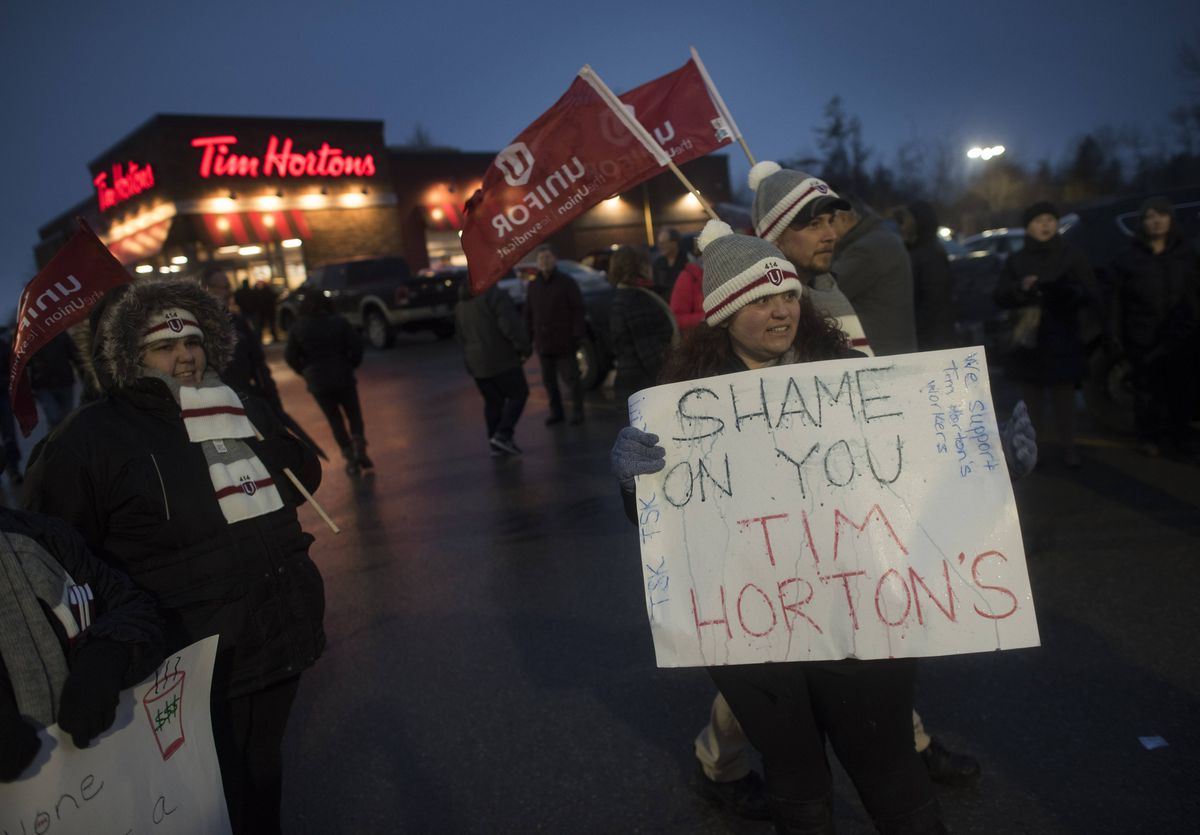Tim Hortons in the town of Cobourg has become ground zero for public anger in Ontario since New Year’s, when local owners cut workers’ benefits after a hike in the provincial minimum wage. On Wednesday, a group of seniors sat at a table as usual in one of the cafés, and a steady stream of people carried away double-doubles and muffins all afternoon.
By evening, nearly 100 protesters were chanting slogans and holding labour banners high outside the restaurant as part of a series of rallies across Ontario to protest against the actions a number of Tim Hortons franchisees have taken since the hourly minimum wage increased from $11.60 to $14 on Jan. 1.
Business groups say Premier Kathleen Wynne’s government implemented the raise too quickly. The Bank of Canada has warned that minimum-wage hikes across the country could cost nearly 60,000 jobs by 2019, and Ms. Wynne has found herself in a shouting match with some business owners, calling their responses to the wage increases “bullying.”
On Tuesday, a social-media campaign began encouraging people to boycott Tim Hortons to show solidarity with the workers.
The minimum-wage battle started after employees at two Tim Hortons in Cobourg owned by Ron Joyce Jr. and his wife, Jeri Horton-Joyce, the son and daughter of chain co-founders Ron Joyce and Tim Horton, said they received a letter in December telling them they would no longer be entitled to paid breaks or some other perks, and would need to cover at least half of the cost of their dental and health benefits. In the letter, the couple blamed the minimum-wage increase.
“These are the faces of Tim Hortons,” said John MacDonald, the head of the Durham Region Labour Council, who helped organize the rally. “They’re the people that millions of Canadians see every morning when they grab their coffee or breakfast to start their day. I find it absolutely repulsive the way the owners have reacted to this, over just a few dollars.”
Some Tim Hortons locations are said to have asked employees to turn over their tips or to pay for their own uniforms. Ontario’s Labour Minister has said his office is investigating.
Mr. Joyce and Ms. Horton-Joyce have not responded to requests for comment. In a statement last week, Tim Hortons said the cuts do not “reflect the values of our brand,” adding that staff “should never be used to further an agenda or be treated as just an expense.” The company did not respond to Wednesday’s rally or a call for boycotts.
At the Cobourg café, Kevin Bandy said he supported the increased minimum wage as he walked out with a large coffee. “For anybody to make a half-decent living nowadays, people need to make $14 or $15 per hour,” he said, adding that he did not approve of the owners’ response. “I don’t think the owners here are hurting. I would think they have a half-decent lifestyle and to take away from somebody else to improve theirs, well, that just isn’t fair.”
While few in Cobourg opposed the minimum-wage hike, Calvin Allin touched on one of the main criticisms from locals. “I think it happened too fast. That’s a pretty big jump, over two bucks an hour. I’d like a 21-per-cent raise. But it’s an election year, you know,” he said.
Like Mr. Bandy, he also did not feel comfortable with the way the local owners had responded.
In a statement on Wednesday, the Ontario Chamber of Commerce said it has warned for months that the wage increases would lead to painful cuts. “We are seeing these consequences come to fruition as businesses take extraordinary actions,” the group said in a statement. “The implementation was too much, too fast.”
Ontario NDP Leader Andrea Horwath, who was at the Cobourg rally, said Ms. Wynne’s government should have increased the minimum wage earlier. She also took aim at the local owners. “It’s unfortunate that folks like the franchisees at this particular location have decided that they are going to do whatever they can to ensure that the folks here don’t get the full benefit of the minimum wage,” she said.
Mark Cole, who owns a small coffee shop on Cobourg’s main street, said the spike in the minimum wage forced his business to increase the prices of the coffees and pastries it sells.
“For the most part, people here have supported the wage increase,” he said. “I don’t think they’ve liked how Tim Hortons has handled it. It’s not a small chain, it’s a giant corporation and they should be able to deal with it better. People have understood why I’ve raised my prices.”
JUSTIN GIOVANNETTI
The Globe and Mail, January 10, 2018

